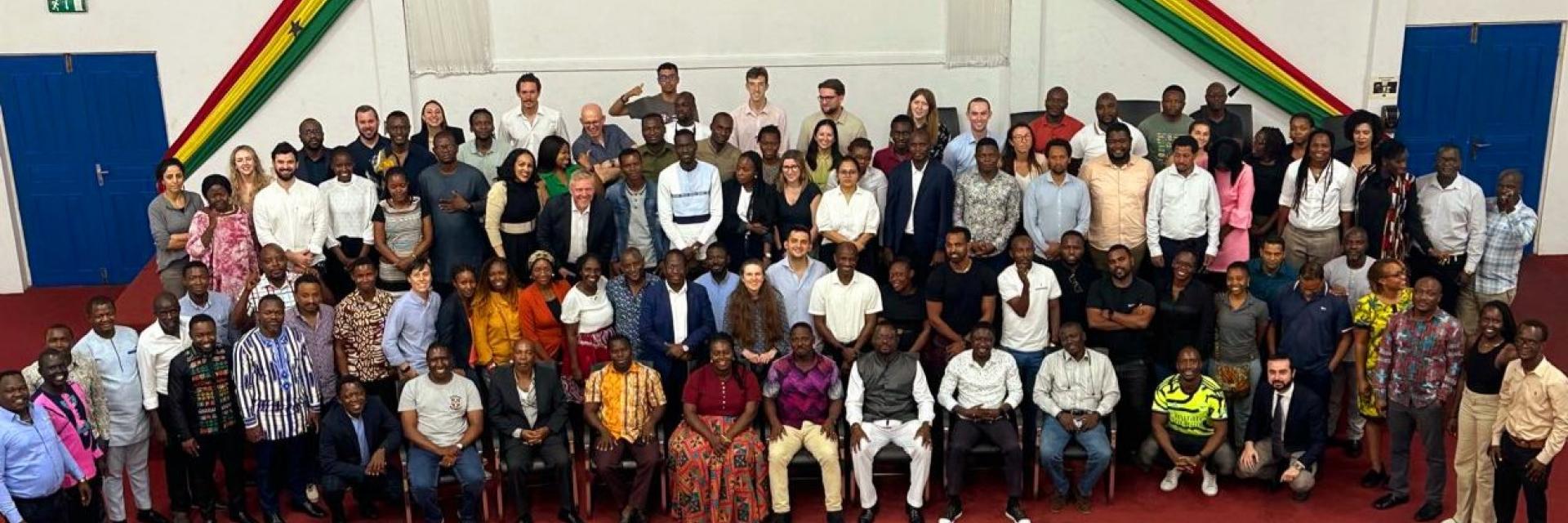Accra, Ghana, 14 June 2024 (ECA) - The United Nations Economic Commission for Africa (ECA) in collaboration with the Ghana Institute of Management and Public Administration (GIMPA) has trained 83 national experts on energy modeling tools to build efficient energy systems as Africa accelerates its transition to low-carbon and climate-resilient development.
Co-convened by the ECA and the Climate Compatible Growth (CCG), the Energy Modelling Platform for Africa (EMP-A) is a capacity building initiative designed to create optimized investments for the energy transition in Africa and to meet its growing demand for low-carbon development.
Mekalia Paulos, Research Officer: Energy Transition & Climate Finance in the Climate Change, Food Security and Natural Resources Division of ECA, stated that the EMP-A was held as African countries find themselves at a critical juncture, where global decarbonization efforts are gaining pace, demanding a holistic, system-wide shift towards low carbon development pathways.
“As Africa strives to meet the considerable energy requirements of its rising population, attain the SDGs as well as realize its industrialization ambitions enshrined in Agenda 2063, the urgent need for strategic long term energy planning cannot be more essential”, said Ms. Mekalia. “Harnessing open-source modelling tools, the EMP-A can support African governments analyze policies and challenges specific to their respective countries in such a way as to ensure their energy resources meet national imperatives towards sustainability and climate-resilient growth. This is crucial as local ownership and sustainability of the process is essential for continuity and real developmental impact.”
The CCG programme is funded by the UK’s Foreign, Commonwealth and Development Office (FCDO) to support investment in sustainable energy and transport systems to meet development priorities in the Global South. The training brought together the energy planning and modeling community in Africa to share experiences, models, and data in climate, land, energy, and water systems.
The training culminated in a high-level meeting on May 31st, where in collaboration with World Resources Institute (WRI) Africa, Sustainable Energy for All (SEforALL), the African Union Commission, and the African Energy Commission (AFREC). ECA organized a panel session on the Africa Energy Dialogues. Launched recently, the dialogues aim to stimulate open, evidence-based discourse across the African continent among public and private sector stakeholders, research institutions, civil society, and development partners on issues related to the design and implementation of African countries' energy pathways.
Titled “Data-Driven Policymaking in Africa’s Energy Transitions”, and moderated by Mekalia Paulos of the ECA, the panel brought together experts from Ghana, Kenya, Mozambique and South Africa to delve deeper into the challenges and opportunities the energy transition presents as well as share perspectives on how data and the modelling tools provided by the EMP-A can inform their respective transition plans. There was consensus on the urgent need for African voices to converge in the development of nuanced energy transition and crucially, the urgent need for strengthened international cooperation, increasing concessional finance and de-risking facilities which will be pivotal for amplifying private investment on the continent. Notably, mobilizing domestic sources of capital and local currency funding will be vital.
Mercy Kimwa, from the Ministry of Energy and Petroleum, Kenya stated, “the training will greatly contribute to my work as we embark on implementing the Kenya Energy Transition and Implementation Plan (ETIP). Considering the priorities for the current government, we will be able to run scenarios that relate to the BETA agenda and see how best to adopt the strategy to meet the current government priorities.”
Imaculada Dos Santos, from the Ministry of Mineral Resources and Energy (MIREME), Mozambique said “MIREME is currently developing an integrated planning platform, therefore the results of the training will be useful in supporting the decision making on which [energy] technologies to implement in the country.”
For her part, Alison Hughes, a researcher from the University of Cape Town, said, “The training sessions placed firm deliverables on the various teams, and it was an opportunity to interrogate and present model results.”
Improving energy access in Africa in the context of SDG7 goals requires game-changing policies and investment. The goal should be pursued within the context of a transitioning energy system that leverages the continent’s immense clean energy potential while phasing-out carbon-intensive technologies and resources.
The EMP-A continues to gain interest and momentum, growing year on year in participant numbers. The first EMP-A training took place in 2018 in Addis Ababa. The 2024 iteration is the fifth, during which national experts were trained on an expanded set of 8 tracks, namely OsEMosys, OnSET, CLEWs, FinPlan, ETP, MAED, Microgrids and Energy Access Explorer.
The course attracted participants from Cameroon, Democratic Republic of Congo, Ethiopia, Ghana, Kenya, Malawi, Mauritius, Mozambique, Nigeria, Rwanda, Senegal, Sierra Leone, South Africa, South Sudan, Tanzania, Uganda and Zambia.
Issued by:
Communications Section
Economic Commission for Africa
PO Box 3001
Addis Ababa
Ethiopia
Tel: +251 11 551 5826
E-mail: eca-info@un.org

